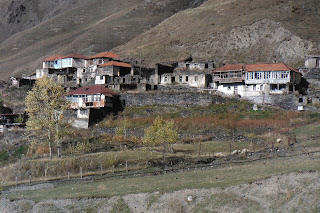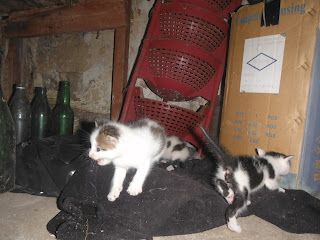Thursday, October 18th to Sunday October 21st
The fifth week of school was over. It was during this week,
I watched the film, "Dinner With Andre." The movie is dialogue
entire, between two men in a restaurant. A deeply philosophical movie, one of
the things they talk about is going to places, to break their routine. I wont
go much further into the movie, I only speak of it because it gave me
motivation to go on an excursion to Mt. Kazbegi in the North Caucus mountains,
even though the other volunteers couldn't make it. Traveling alone, I would
have a different experience than traveling in a group.
Having taken Friday off, and having no classes scheduled for
me on Thursday, I was free to take the train to Tbilisi, and from there to
Kazbegi.
The train ride was another joyful trip, before sleep took
over, I spoke with two men who shared my cab. The younger, more talkative one
bought some beer at the Kobuleti stop, and we drank to our health and to
Georgia and America, and to our families. The older one, a small man in a
leather jacket, was going to Tbilisi for surgery. He works in Istanbul. For
twenty five years, he has been working as a sailor. I hope the man's health
picks up, I enjoyed speaking with him. Soon after drinking and eating chips, I
fell asleep. Waking up in Tbilisi, I said my goodbyes to my cab-mates, and stepped
off the train.
At the station, a bus was scheduled to leave to Kazbegi, a
short walk and a few inquiry's later brought me to the proper minibus, scheduled
to drive to Stephantsminda, the village closest to Mt Kazbegi. The bus was
piled to capacity, mostly European travelers.
The road to Stephansminda is an ancient rout known as the
Georgian Millitary highway. The rout travels through a pass cut by glaciers.
The was built by Russian soldiers to connect Georgia to the Russian province of
Chechnya, before the highway was only a dirt track. This is the place where
Pompey of Rome traveled in conquest. He came, he stopped, and he turned back.
Scythia, the steppe north of the Mountains was believed to be the end of the
world and not worth the visit.
The day I traveled the Georgian military highway, the hill
country's deciduous forest was ablaze with Autumn colors. Up at a higher
elevation, the forest advances no further up the steepening slopes, yielding to
subalpine grasses and sporadic birch and pine groves. The narrow river valley
we are traveling in widens into a broad flat plain, carved from glaciers. From
this valley, the road turned into a wide dirt track, designed for tanks and
machines of war, whose treads eat asphalt that tires glide over. Our bus
bounced past other cars, buses, and semi-trucks. I had read the Russian border
was closed, but the stream of traffic indicated otherwise.
Across the river adjacent to the road, a village lies on
slope, above a steep drop into the river
below. There was no road or bridge from where we were. The only rout I observed
into that village was by a cable-car. The car looked like it could fit only two
people, and hangs suspended over the river.
Past the isolated village, we drove through more towns
before making our final destination to Stephantsminda.
Stepping off the bus, I was struck by the Fall aroma from
the beach trees. The thin, cold air seemed to amplify the decaying leaves.
Instantaneously, I liked this place more than Mestia in Svaneti.
Having first acquired a guest house, I spend the day
exploring the town. I walked up to the pine forest above the town, and was able
to read a great deal of Cormac McCarthy's book The Crossing. Sitting in
the sun, overlooking the town with a view of the church and Mt. Kazbegi. This
first day, I didn't want to go on excursions, but to just enjoy the mountains
by simply being in them.
Early the next morning, after eating a home cooked meal of
mashed potatoes with cheese, I walked to the town center and rented a bicycle.
South along the river, I rode towards Sno Valley. When I arrived at the village
of Sno, I stopped to view the town's sole tower, overlooking the city. I parked
my bike by an ancient wall, and looked for an entrance. While searching, an old
man came by in a cart drawn by a donkey. We spoke, but I couldn't understand
him at all, as if he has had a stroke. I held donkey by the reins, as he
fetched some water from some spring, for his burro. From there, I found the way
up into the tower. I climbed the narrow ladder up to the head. The interior was
cramped and dark. The top yielded view of the surrounding town and mountains.
Soon after, I was back on the road heading further up the valley.
Past several other villages, I rode on. The land was
populated by grazing cows, sheep and horses. The animals were accompanied by
either shepherds or their special breed of dog. The dogs were huge, and with
cropped ears, with a friendly disposition. In the villages, pigs hung about the
muddy streets, scattering when they saw me riding towards them.
The dirt road to the final town of Juta ran up a mountain
side. The temperatures fluctuated in the extreme, thanks to the combination of
sun, shade and wind; rest and activity. Looking up, I spotted circling birds
overhead. In this windswept mountainside of no trees, herds, water, or shelter,
I felt completely isolated, almost like I was on a Martian planet. There was no
sign of the village, or of any people whatsoever. Quite a unique feeling.
When I arrived at Juta, I came upon a source of water for
which I was thankful for, having run out on the road. By then, it was noon and
I was exhausted from riding/walking up to Juta. After moving past Juta, I left
my bike locked to a fencepost and continued on up the valley. Where the road
ends and only a dirt track is there, which is traversed by horse drawn carts or
by foot. Wind would gust through the valley, shared by cows and horses.
squat, square structures came into view in the distance,
which when I got closer, I could see was a military outpost. A man waved me
over, for which I waved back and walked to. They invited me over to speak,
curious to see a lone foreigner in the mountains. I was curious why they were
there as well. I was told that past the mountain in the north, laid Chechnya
and to the south east was Ratcha, accessible after a 8 hour hike through a
pass. We had coffee inside their camp, which was occupied by three friendly Georgian
military men. I wanted to take more pictures, but I did not think it wise to
take pictures of their camp, however friendly my hosts were.
After the hot cup of coffee, I gave my thanks and headed
back to Stephantsminda. The bike ride down the mountain was exhilarating. I
didn't realize the climb I had made. On the way down, I hardly had to do any
pedaling!
Within forty-five minutes, I had arrived back in
Stephantsminda. The sun was still high up in the sky, and I still had the
energy, so I decided to continue past the town, heading North on the highway. A
few kilometers up the road, lay the Georgian Russian border.
Soon after Stephansminda, the terrain becomes rugged, gone
is the flat and grass-covered glacial plain that Stephansminda rests on. Here cragged
peaks dip down steeply into a narrow and rocky riverbed. Shrubs and Pines cling
to the mountains' shanks as the road, built alongside a cliff face winds down
in elevation. Aside from one village adjacent to the riverbed, the land along
the highway is wilderness.
It was on this rout, that I came across a tunnel. two
hundred meters bored through the mountain side created a menacing, unlit gaping
mouth. Having stopped at the entrance, I continued down into the tunnel as blackness
overtook me. I continued on, picking up speed naturally from gravity until the
light was not even enough to distinguish shapes, where the road was and where
the stone walls were.
Riding a bike in darkness is an exhilarating feeling. You
feel the wind on your face, and can hear the wheels spinning on, yet you are
unable to have a sense of direction. As your sight dims to memory of the
terrain, you become disoriented, as though your bike stirs itself. It becomes
impossible to continue this way, only after dismounting does the spinning
wheels respond to your control. Through that thin cool air, you walk along side
the road, until your surroundings are lit once again from the end of the
tunnel.
Upon reaching the Georgian checkpoint, I knew it wasn't going
to get any further. Cars coming from Russia were stopped several lanes in. As I
entered the fenced compound guard dogs barked incessantly at my passing. A far
cry from the outpost I encountered earlier. Here, the guards were armed with
black metallic guns, slung over their shoulder. "Sad Midixar?" One of
them asked me, as I approached him.
Tyler: Do you speak English?
Border guard: A little. Passport?
Tyler: I don't have it.
Border Guard: Do you want to go to Russia?
Tyler: No, I want to see the border with Chechnya.
A long pause, the other guard was curious and came over. He
replied.
Border Guard: I'm sorry you must go back.
Going back was a two hour bike ride up back to
Stephantsminda. By the time I reached the top, my legs were jelly. The bike was
returned as the sun was setting, having just slid behind the frosted peaks.
Although I traveled alone on this trip, I was never isolated from other travelers, and had a few beers with them after the daily excursions. I feel that branching out from the TLG group is better than just being with the same people.
 |
| View from the GMH. |
 |
| Sheep dog puppy. |
 |
| GMH going away from Stephantsminda |
 |
| Tower at Sno village. |
 |
| Upper Sno valley. You can see the military outpost to the left. |
| Panorama |
 |
| These are what the villages look like up here. |
 |
| I missed this when I rode by it the first time. |
 |
| Road to Russia |
 |
| Georgian checkpoint |
 |
| The tunnel I rode through in pitch darkness. |
 |
| Kitty news: 'Knuti' is kitten in Georgian. They are now wondering the property . |






































